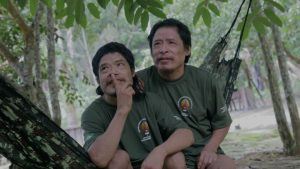Kanishk Tharoor at The Atlantic:
 Media coverage of uncontacted tribes often delights in painting indigenous groups as people out of time, hunter-gatherers in the age of Seamless. In November, an American missionary was killed trying to reach North Sentinel Island in the Bay of Bengal, home to a remote tribe thought to number about 100 people. Grainy images shot from a helicopter in 2004 of naked islanders brandishing spears flooded the internet. But when they first appear in Piripkura, Pakyî and Tamandua offer a different kind of spectacle. What is striking about them is not their timelessness, but rather their very modern resolve to persist against the odds, to be free from the outside world.
Media coverage of uncontacted tribes often delights in painting indigenous groups as people out of time, hunter-gatherers in the age of Seamless. In November, an American missionary was killed trying to reach North Sentinel Island in the Bay of Bengal, home to a remote tribe thought to number about 100 people. Grainy images shot from a helicopter in 2004 of naked islanders brandishing spears flooded the internet. But when they first appear in Piripkura, Pakyî and Tamandua offer a different kind of spectacle. What is striking about them is not their timelessness, but rather their very modern resolve to persist against the odds, to be free from the outside world.
That independence is likely to come further under threat from the incoming far-right president, Jair Bolsonaro, who has pledged not to reserve any more land for indigenous peoples. In previous years, Bolsonaro has said he would arm ranchers in their conflicts with native groups and has lamented that the Brazilian army was not as efficient as the American cavalry in exterminatingindigenous tribes. When trying to put a more benign gloss on these statements, Bolsonaro has claimed that government protections unfairly exclude indigenous people from the benefits of 21st-century life.
more here.
